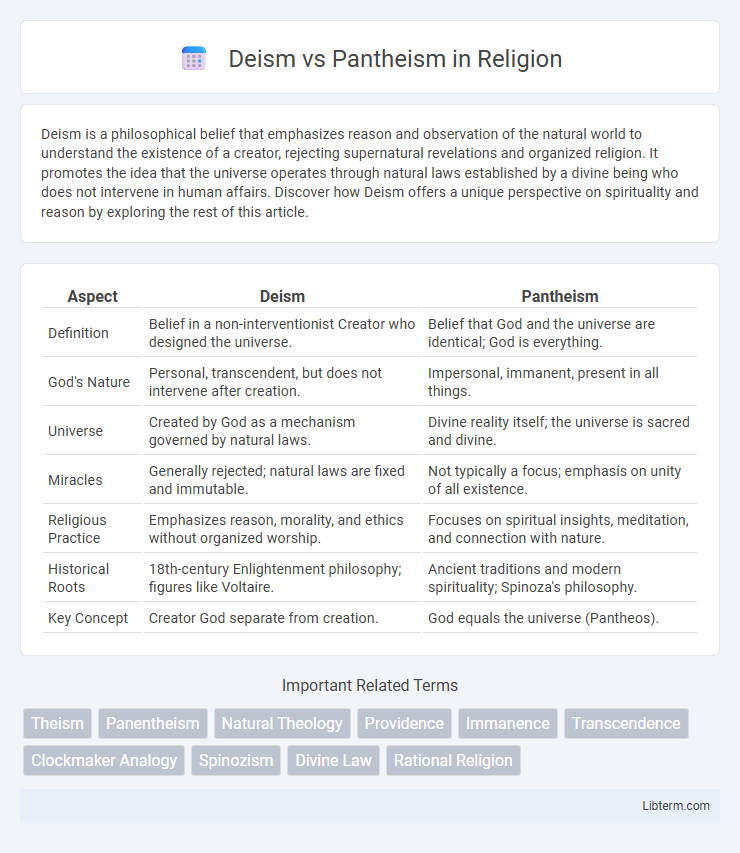Deism is a philosophical belief that emphasizes reason and observation of the natural world to understand the existence of a creator, rejecting supernatural revelations and organized religion. It promotes the idea that the universe operates through natural laws established by a divine being who does not intervene in human affairs. Discover how Deism offers a unique perspective on spirituality and reason by exploring the rest of this article.
Table of Comparison
| Aspect | Deism | Pantheism |
|---|---|---|
| Definition | Belief in a non-interventionist Creator who designed the universe. | Belief that God and the universe are identical; God is everything. |
| God's Nature | Personal, transcendent, but does not intervene after creation. | Impersonal, immanent, present in all things. |
| Universe | Created by God as a mechanism governed by natural laws. | Divine reality itself; the universe is sacred and divine. |
| Miracles | Generally rejected; natural laws are fixed and immutable. | Not typically a focus; emphasis on unity of all existence. |
| Religious Practice | Emphasizes reason, morality, and ethics without organized worship. | Focuses on spiritual insights, meditation, and connection with nature. |
| Historical Roots | 18th-century Enlightenment philosophy; figures like Voltaire. | Ancient traditions and modern spirituality; Spinoza's philosophy. |
| Key Concept | Creator God separate from creation. | God equals the universe (Pantheos). |
Introduction to Deism and Pantheism
Deism is the belief in a rational creator who designed the universe but does not intervene in its operation, emphasizing reason and natural laws. Pantheism identifies God with the universe itself, viewing everything collectively as a divine unity without a distinct personal deity. Both philosophies offer distinct views on the nature of divinity and the cosmos, influencing theological and philosophical discussions.
Historical Origins and Development
Deism originated in the 17th and 18th centuries during the Enlightenment, emphasizing reason and natural theology as the basis for belief in a non-interventionist Creator, contrasting with revelation-based religions. Pantheism has roots in ancient philosophical traditions, particularly in Stoicism and Eastern religions, viewing God and the universe as identical and emphasizing an immanent divine presence throughout nature. Both concepts evolved through critical philosophical debates, influencing modern spirituality and the understanding of divinity in relation to the cosmos.
Foundational Beliefs and Core Principles
Deism asserts the existence of an impersonal creator who set the universe in motion but does not intervene in its processes, emphasizing reason and observation as paths to understanding God. Pantheism identifies God with the universe itself, viewing all existence as a manifestation of a singular, immanent divine essence, rejecting a separate, personal deity. The core principle of Deism is a non-interventionist creator, while Pantheism centers on the unity of divinity and the cosmos.
Concept of God in Deism vs Pantheism
Deism conceptualizes God as a transcendent, non-interventionist creator who set the universe in motion and does not interfere with natural laws or human affairs. Pantheism, in contrast, identifies God with the universe itself, viewing the divine as immanent and synonymous with all existence. This fundamental difference highlights Deism's emphasis on a distinct, personal creator and Pantheism's perspective of God as an all-encompassing, impersonal force.
Views on Nature and the Universe
Deism views nature and the universe as the creation of a rational, detached God who set natural laws in motion without further intervention. Pantheism identifies the universe and nature as divine itself, asserting that God and the cosmos are identical and continuously interconnected. While Deism emphasizes a creator separate from nature, Pantheism perceives the universe as an immanent expression of the divine.
Attitudes Toward Organized Religion
Deism generally rejects organized religion, emphasizing reason and individual understanding of a creator without reliance on divine revelation or religious institutions. Pantheism views divinity as synonymous with the universe, often dismissing formal religious structures in favor of a spiritual connection with nature and cosmos. Both perspectives critique traditional organized religion but differ in their conceptualization of the divine and the role of spiritual practice.
Human Purpose and Moral Guidance
Deism posits that human purpose is derived from a rational Creator who established natural laws, encouraging individuals to seek moral guidance through reason and observation rather than revealed religion. Pantheism identifies the divine with the universe itself, suggesting that human purpose aligns with understanding and harmonizing with the interconnectedness of all existence, promoting moral guidance through unity and natural order. Both perspectives emphasize intrinsic human responsibility but differ in grounding morality either in a transcendent Creator or an immanent universal spirit.
Famous Thinkers and Advocates
Rene Descartes and Thomas Paine are notable advocates of Deism, emphasizing a rational understanding of God as a distant, non-interventionist creator. Baruch Spinoza is a key figure in Pantheism, positing God and Nature as identical, promoting a unified, immanent divine presence. Both philosophies influenced Enlightenment thinkers and continue to shape contemporary discussions on spirituality and religion.
Modern Relevance and Influence
Deism emphasizes a non-interventionist creator, resonating with Enlightenment values and influencing modern secular thought by promoting reason over dogma. Pantheism, equating divinity with the universe, inspires contemporary environmentalism and holistic spirituality through its interconnected worldview. Both belief systems shape modern philosophical and ecological discussions by challenging traditional theistic paradigms.
Key Differences Summarized
Deism centers on the belief in a creator who designs the universe but remains uninvolved in its ongoing affairs, emphasizing reason and observation over revelation. Pantheism equates God with the universe itself, viewing divinity as an immanent force present in all aspects of nature. The key difference lies in Deism's transcendental, non-interventionist creator versus Pantheism's identification of God with the immanent, all-encompassing cosmos.
Deism Infographic

 libterm.com
libterm.com